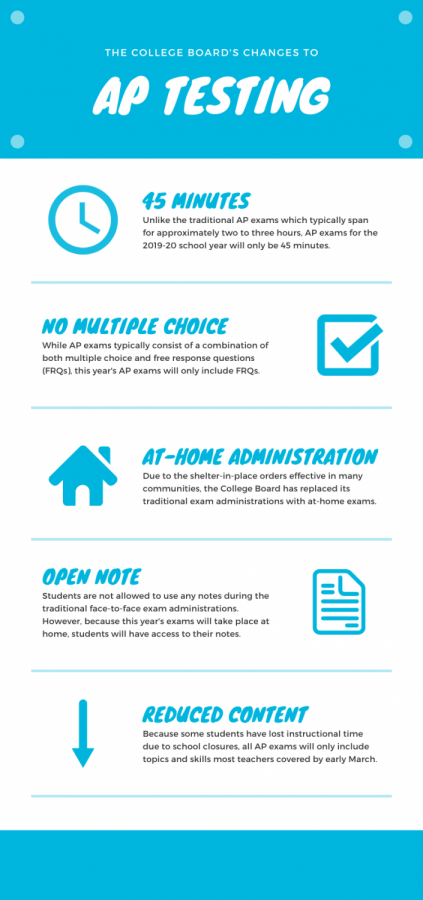The College Board updates AP testing procedures in response to COVID-19
Traditional face-to-face exam administrations are revised to a 45-minute online free-response exam taken at home
March 25, 2020
On March 20, the College Board posted an update to its website, explaining the changes it will make to the Advanced Placement (AP) exams for the 2019-20 school year. In response to the COVID-19 (coronavirus) outbreak, which has posed unprecedented educational challenges for multiple schools and communities across the nation, the College Board is providing free remote learning resources and offering new at-home testing administration to those taking an AP Exam this year.
After surveying 18,000 AP students, the College Board stated that “students remain eager to take AP exams and have a chance to earn credit and placement… 91% indicated that they want to complete this important step.” As such, the College Board decided to continue with AP testing despite the coronavirus outbreak.
Beginning March 25, students and teachers have free access to live, mobile-friendly AP review courses. In addition, free-response questions (FRQs) that were only available for in-classroom use due to security concerns are now available for use by all students and teachers on their website.
In place of the traditional testing environment, students will take a 45-minute online FRQ exam at home, which will be open note. The exams themselves will only include topics and skills that most teachers covered by early March in order to give a fair learning opportunity to all students, some of whom have lost instructional time due to school closures. Furthermore, for each AP subject, there will be two different testing dates students can choose from — those who wish for extra preparation time can choose the later date. Additional details regarding the AP schedule will be available on April 3.

An explanation of the College Board’s changes to AP testing for the 2019-20 school year
The changes to AP testing have received both positive and negative responses from the community. Junior Dhanush Ramkumar, who is planning on taking the AP Physics 1 and AP Computer Science A exams, believes that the new system will “heavily benefit” students taking AP tests this year.
“For CS, the two hardest topics, in my opinion, recursion and inheritance, are not going to be on the test,” Ramkumar said. “In Physics, most of the content from second semester is cut. Initially, I thought it was a joke because this new format would make getting a 5 so much easier. My friends and I started joking about how we could sign up for more AP tests and easily get a 5 with minimal studying.”
While junior Parth Asawa, who is planning on taking five AP tests this year, views the change as a slight relief from the typically stressful AP exam preparation season, he does not favor the change overall.
“A shortened test wasn’t an idea that made total sense to me because in 45 minutes, how much of your knowledge of a year’s worth of learning can they truly assess?” Asawa said. “The changes decrease the amount of material students learn from a course and greatly diminish the depth and accuracy of College Board’s assessment of one’s actual knowledge of the subject.”
Ramkumar comments that because less material is going to be tested, scores will be inflated, making it easier for more students to receive higher scores on their exams.
“A part of me is relieved because of how easy the AP tests seem to be this year in comparison to previous years, but another part of me is scared to know how the College Board will deal with the scores once they realize how skewed the scores are,” Ramkumar said. “Colleges would have to treat a 5 on Physics 1 during 2020 differently than a 5 during 2019. Even if it is easier to get a 5 this year, I don’t know if it will benefit the students in the long run.”
Despite some of the student apprehension toward the changes, Assistant Principal Nico Flores does not believe the new method of test administration will affect students’ decisions to take AP exams.
“With our teachers having done such a wonderful job preparing students up to March… along with the support students will continue to receive from their teachers and College Board, I feel the students will be confident in their abilities to perform well on the AP exam which, in my opinion, will have little impact on students’ decisions to take the AP exam that is on their schedule,” Flores said.
The shift from face-to-face exam administrations to online at-home tests has raised some other questions, more specifically in regards to test security. The College Board states that exam questions are “designed and administered in ways that prevent cheating” by using “a range of digital security tools and techniques, including plagiarism detection software, to protect the integrity of the exams.” Despite these claims by the College Board, Asawa expresses his concern about the new test-taking procedure.
“I do think that [violations] of academic integrity will go up,” Asawa said. “This is just because in a normal AP testing environment, they’re fairly strict about making sure that cheating is difficult and I don’t actually know of anyone who has successfully cheated on an AP test. However, with the ability now to use notes, textbooks and other people undetected, I’m fairly certain that a portion of students around the nation would turn to academic dishonesty.”
Consequently, Asawa believes that the value of taking an AP exam has gone down, not only because certain universities may no longer give credit for AP tests taken this year due to the skewed score distributions, but also because students are not able to learn the full content normally taught in an AP course.
“In general, there is a lot that is unknown with the situation given the evolving nature of the pandemic, but students are losing value in that they are no longer learning the full material of the course, and quite simply may not receive credit even for what they have learned depending on the response of individual universities across the nation,” Asawa said.
While the changes are still quite new, meaning it is difficult to definitively determine the effectiveness of the College Board’s response, Flores believes that the College Board has taken the most fitting steps given the situation.
“I actually think that College Board created an opportunity to reduce anxiety and anxiousness for our students and staff as they navigate their way through their AP courses,” Flores said. “I also feel this could impact all of our students and teachers as we look to reconnect with our students, continue to build strong relationships with each other and tap back into the humanity of schooling really focusing on people first and school second.”


















